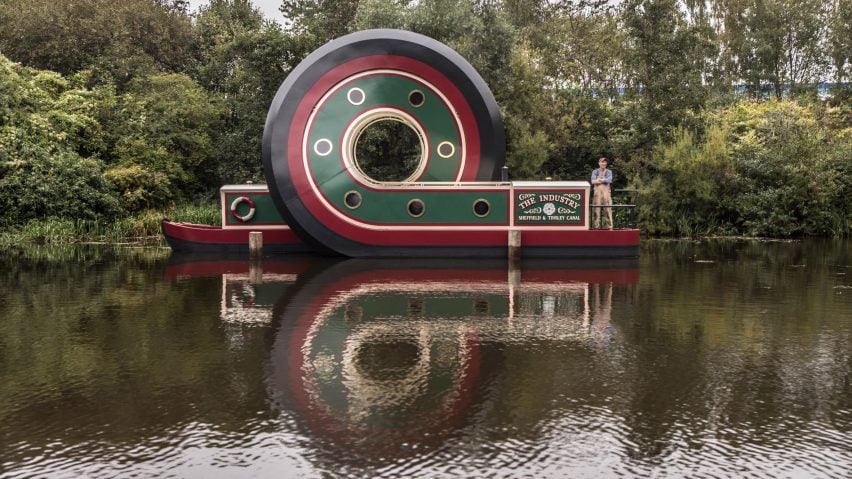British artist Alex Chinneck has created a six-metre-high, looped canal boat on the Sheffield & Tinsley Canal in England as a "playful distortion of the familiar".
Designed to celebrate the heritage of the canal, the 13-metre-long and six-metre-high sculpture was created as a free-to-visit artwork that appears to float.
With the loop-the-loop boat, Chinneck aimed to draw attention to the history of the canal in a playful and contemporary way.
"All of our surreal public artworks [in Tinsley] share the sculptural language of fluidity in a typically inflexible form," Chinneck told Dezeen.
"The 200-plus-year-old Sheffield & Tinsley Canal is an under-celebrated gem on the edge of the city, and we wanted to encourage the recreational use and discovery of its charm. The use of a canal boat is contextually responsive and the artwork offers a surreal and playful distortion of the familiar," he continued.
"Ultimately we wanted to create an intervention that celebrated the history of the canal and resonated with its industrial heritage while creating a contemporary artwork with a playful and positive personality."
Located alongside the Sheffield Ikea, the installation was moored between locks four and five of Sheffield & Tinsley Canal, so that people could view it from both the towpath and boats on the canal.
The main body of the boat was fabricated from eight tonnes of steel as a nod to the city's steel-working history, with the upper, looped section made from rolled aluminium.
"The canal was once lined with brick factories and chimneys that played a significant role in Sheffield's historic steel industry," said Chinneck.
"It therefore made sense to design an artwork that pushed the manipulation of steel into extreme and ambitious territory."
The installation was constructed in prefabricated sections that were transported to the site along the canal. It was then assembled on site and positioned on a frame embedded in the bed of the canal.
It was decorated to mimic nearby canal boats, with a White Rose as a symbol of Sheffield, and named The Industry after the first boat to navigate the canal in 1819.
According to Chinneck, the canal location added a layer of complexity to the already complex project with the sections having to navigate locks and the water level having to be lower to allow them to pass under bridges.
"Working within a canal system adds a layer of complexity that we've not experienced before," said Chinneck. "There is no vehicular access to the site so we transported the two sections of the artwork by canal."
"They travelled two miles from Rotherham to Sheffield through eight locks, under eight bridges and beneath the M1. The steel hull section was floated to site along the waterway and then scuttled once in position to allow the boat to flood," he continued.
"The aluminium loop was transported in a specialist hopper and is believed to be the tallest structure to navigate the canal system in the last 70 years," he explained. "Over a mile of the canal was lowered by up to 70 centimetres, leaving centimetres to spare between the loop and the lowest rail bridge."
"In short, it was tricky," he added. "Using the canal as a means of transportation and assembly added cost but unquestionably added charm."
The loop-the loop canal boat is the latest in a series of works created in Tinsley by Chinneck, who is known for his surreal urban installations. Previous works include buildings in Milan and London ripped open by zips, a house turned upside-down in London and a building with a facade that seems to have slumped in Margate.
The photography is by Marc Wilmot.

